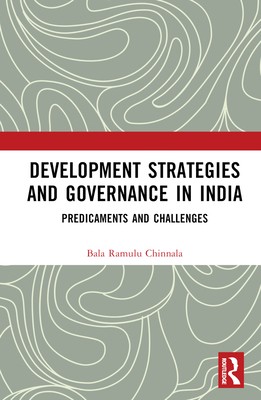
- We will send in 10–14 business days.
- Author: Bala Ramulu Chinnala
- Publisher: Routledge Chapman & Hall
- ISBN-10: 1032842253
- ISBN-13: 9781032842257
- Format: 15.6 x 23.4 x 1.8 cm, kieti viršeliai
- Language: English
- SAVE -10% with code: EXTRA
Development Strategies and Governance in India (e-book) (used book) | bookbook.eu
Reviews
Description
This volume traces India's developmental strategies and governance systems from state-led to market-driven models over seven decades, highlighting the disconnect between the values enshrined in the Constitution and the governance of policies. It examines a broad spectrum of development approaches addressing deeply entrenched socio-economic issues including poverty, unemployment, food insecurity, inequalities, agriculture, technology, pandemics, marginalized communities, people's participation, decentralized governance, and the challenges in socio-economic program implementation.
Underscoring that policies require a clear purpose and trustworthy governance systems for empowering the marginalized, it points out that failures are primarily at the policy level due to a lack of ideological clarity, spurred by growth and welfare dilemmas. The volume further provides insights into India's development and social transformation and serves as a resource for those engaged in the study or practice of policy-making.
This book is particularly valuable for students and researchers of development studies, economics, political economy, public policy, political studies, sociology, governance, and South Asian studies.
EXTRA 10 % discount with code: EXTRA
The promotion ends in 22d.02:28:42
The discount code is valid when purchasing from 10 €. Discounts do not stack.
- Author: Bala Ramulu Chinnala
- Publisher: Routledge Chapman & Hall
- ISBN-10: 1032842253
- ISBN-13: 9781032842257
- Format: 15.6 x 23.4 x 1.8 cm, kieti viršeliai
- Language: English English
This volume traces India's developmental strategies and governance systems from state-led to market-driven models over seven decades, highlighting the disconnect between the values enshrined in the Constitution and the governance of policies. It examines a broad spectrum of development approaches addressing deeply entrenched socio-economic issues including poverty, unemployment, food insecurity, inequalities, agriculture, technology, pandemics, marginalized communities, people's participation, decentralized governance, and the challenges in socio-economic program implementation.
Underscoring that policies require a clear purpose and trustworthy governance systems for empowering the marginalized, it points out that failures are primarily at the policy level due to a lack of ideological clarity, spurred by growth and welfare dilemmas. The volume further provides insights into India's development and social transformation and serves as a resource for those engaged in the study or practice of policy-making.
This book is particularly valuable for students and researchers of development studies, economics, political economy, public policy, political studies, sociology, governance, and South Asian studies.


Reviews